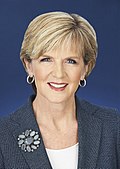This article needs additional citations for verification .(May 2017) |
| This article is part of a series on the |
| Politics of Australia |
|---|
 |
| Constitution |
Western Australia politics takes place in context of a constitutional monarchy with a bicameral parliamentary system, and like other Australian states, Western Australia is part of the federation known as the Commonwealth of Australia.
Contents
- Premier of Western Australia
- State government
- Parliament of Western Australia
- Federal politics
- Referendum results in Western Australia
- Notable Western Australia political figures
- Recent state election results
- See also
- Notes
- References
The main parties are the governing Labor Party and the two Opposition parties (the National Party and the Liberal Party). Other minor political parties include the Greens, Western Australia Party, Shooters, Fishers and Farmers Party, Liberal Democratic Party, Legalise Cannabis WA Party, Pauline Hanson's One Nation and Australian Christians. [1] The other currently registered parties are Animal Justice Party, Democratic Labour Party, and Sustainable Australia Party – Anti-corruption. [2]


